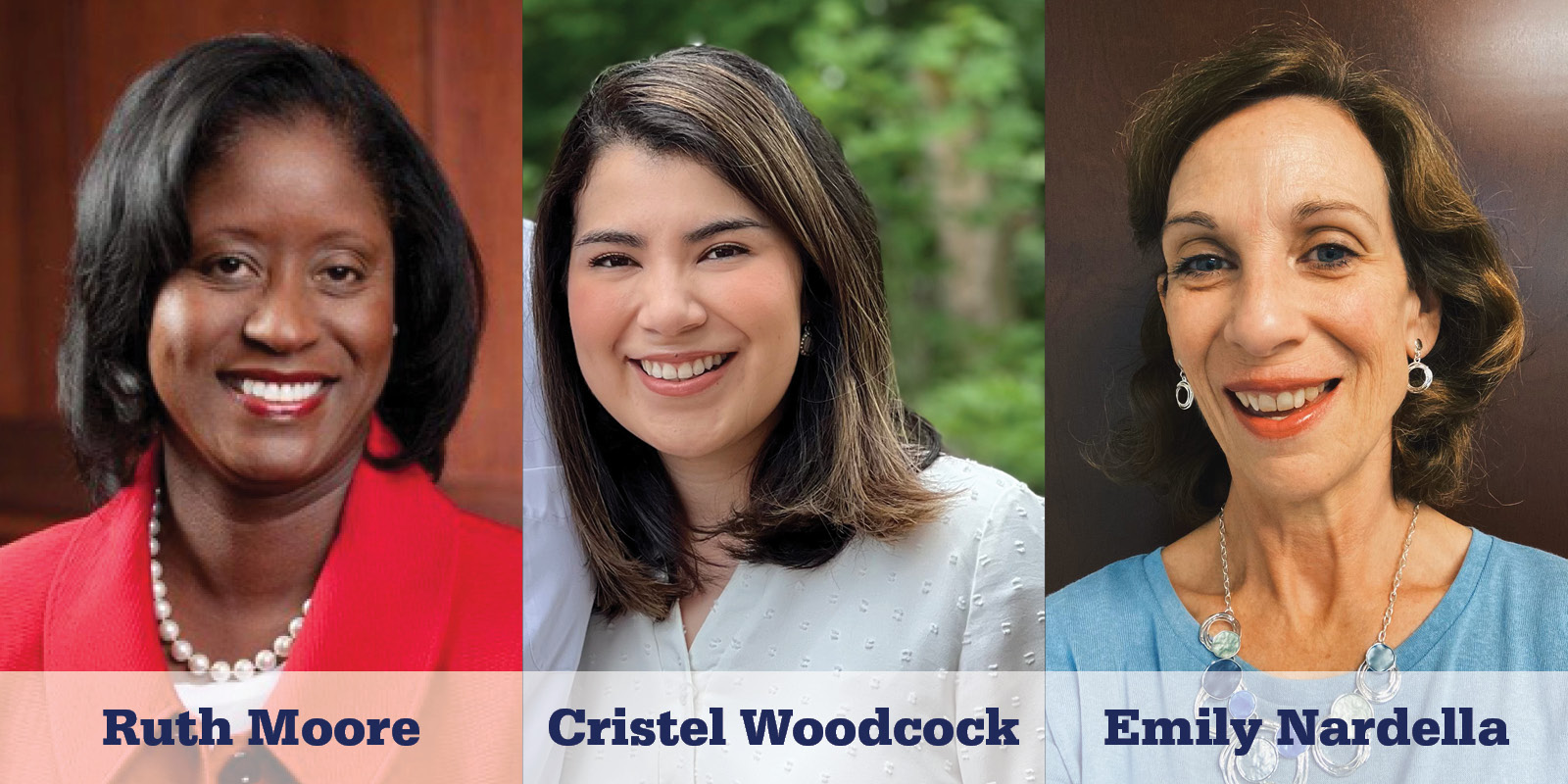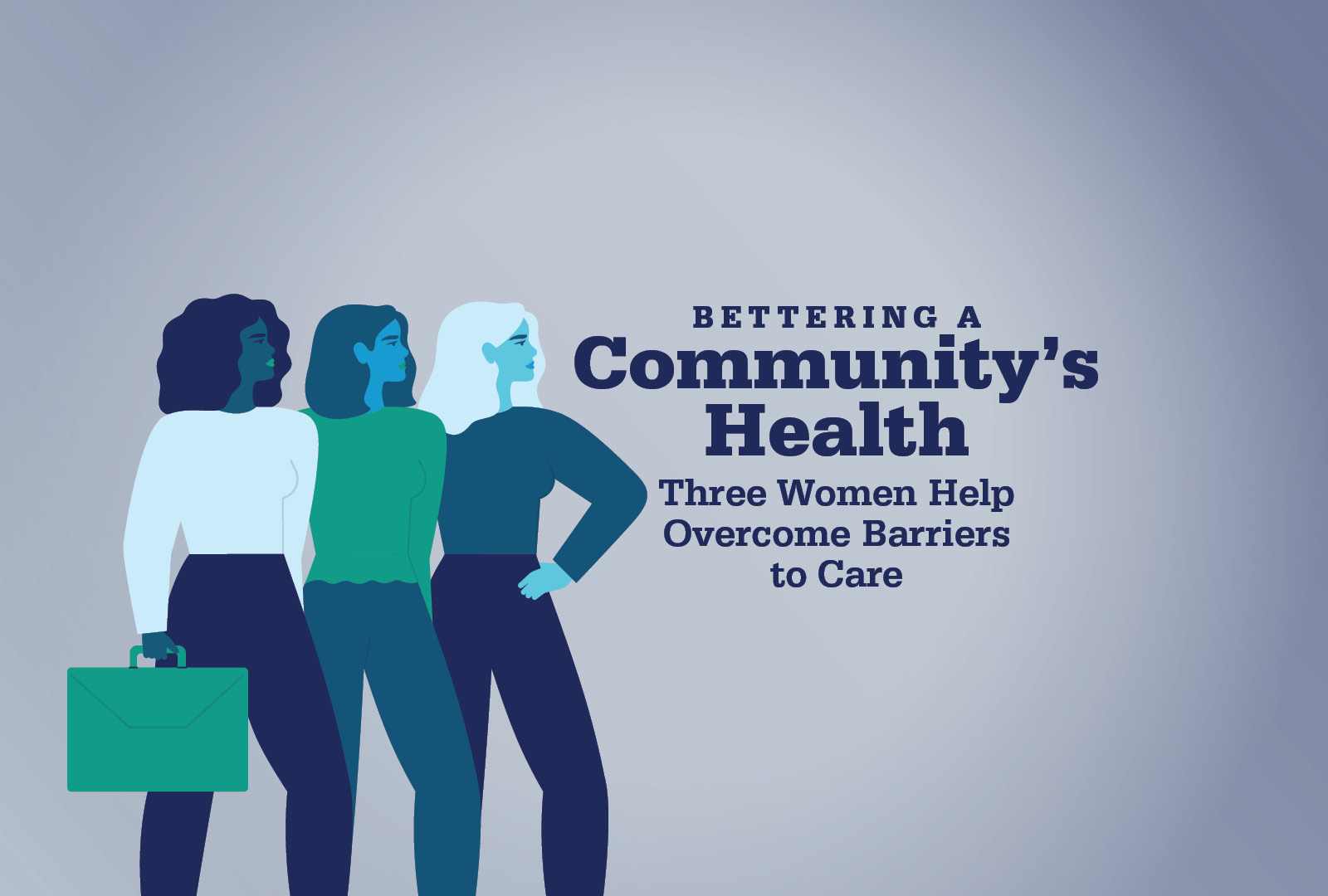In the capital region, three women work together collaboratively to benefit the individuals in the community who need the most help: Ruth Moore, Cristel Woodcock and Emily Nardella.

Ruth, the Director of Community Engagement, Diversity and Inclusion at Pennsylvania Psychiatric Institute (PPI), started at PPI in 2011, as the Director of Business Development and Admissions, until her ability to motivate and educate on the importance of unique individuals and connection shifted her to her current position. A member of several nonprofit organizations, helping her community is not only a part of her job, but a passion.
Cristel, who earned a bachelor’s degree in public health with an emphasis in health promotion, started out in nutrition before navigating to her current role as a Community Health Worker. “I was looking to do some more work in the community, and that’s how Ruth found me,” notes Cristel on her journey to becoming a part of the team at PPI.
Emily is the Senior Manager for Community Impact and Health for the United Way of the Capital Region — a nonprofit working to advance the common good in communities across the world. Before her start in 2018, being a healthcare writer for 18 years gave her an understanding of healthcare access issues. When the full-time position at the United Way became available, her passion and previous knowledge led her to manage the Contact to Care initiative which funds Community Health Workers to improve healthcare access.
In describing how the three work together, Emily begins, “At United Way, we created what we call our core solutions partners — a group of community healthcare leaders who helped design and now guide the Contact to Care program, and Ruth has always been at the table as a representative of Pennsylvania Psychiatric Institute. She has had her hands in this partnership since its start in 2014 when the community assessment determined that health access was a need.”
Dealing with an already underserved population, Ruth reflects on the need she saw at PPI. “Behavioral health services have always had a large area of need. We wanted to find a way to improve access to care and came to the idea of having Contact to Care at PPI.” Although the United Way funds Cristel’s position as the Community Health Worker at PPI, Ruth is her direct manager. “We help those in need of mental health services at PPI, but Cristel helps to connect them with services for the other areas they need help in, like treatment for other medical issues.”
What is a Community Health Worker?
A Community Health Worker (CHW) is a peer leader, an individual who isn’t a clinical provider, but is someone that can help get things done to help others care for themselves. They work to build relationships with those who may not trust the industry. “Often, individuals may be scared to start, not understanding how the system works,” explains Emily. “A CHW provides a hand to hold and helps them find a good place to start the process.”
Sometimes a CHW can connect through a shared culture, language or lived experience in order to provide knowledge to help navigate the health care system. This newfound trust enables the CHW to serve as the link between health or social services and the community to facilitate access to and improve the quality and cultural competence of services.
The joint program has become well known in the community, but health facilities also refer people to this program. “People stay in the program for about a year, ranging from those who need little help, to those who have a high level of need,” explains Cristel.
Each week, all the Contact to Care CHWs come together to talk about their challenges and successes, discussing how they can continually improve care. There are currently seven CHWs employed at all the major healthcare organizations in central PA, with openings for three more. Emily speaks to the growth of the program, “We started with only three CHWs in 2017, and have now expanded to ten positions. To date, our CHWs have helped 826 individuals gain insurance, 1,776 people connect with a medical home and over 3,325 connect with resources in the community to overcome barriers to care.”
Helping the community hands-on.
As a CHW, Cristel works with the community hands-on. Contact to Care CHWs go to the parts of the community that are underserved and attend outreach events in pairs through the United Way’s umbrella initiative. “We’ll go to places like the local food pantry, shelters, libraries and church events, bringing information to share. If we find someone that might qualify, they can fill out the contact form to get assigned to a CHW in their area.
Cristel meets with people in person to go over the program, answers questions, educates them on the resources available to them and helps them set up appointments. “Every individual has different needs, and they approach things very differently. The things we repeat every day can be new to them. I’ll phone a clinic with them on speaker, to show them how to respond and give appropriate information to set up an appointment. I’ll follow up a week, two days or even the day before as needed to make sure they can make their appointment. If they have concerns with any other of their social determinants of health, we have resources that we can provide to them. For example, if food insecurity is an issue, we can help them see if they could qualify for SNAP or qualify through the food bank as well.”
Emily further explains, “The healthcare system is complicated as is. If you don’t understand English well, medical terms and instructions become even more confusing. A person could become overwhelmed and not follow-through on getting the care they need. A CHW gives them aid and empowers them to be able to navigate the system on their own and then teach their family and friends how to do so as well.”
“I want you to know that because of the program, I took back control of my health.” – A program participant thanking Cristel after working together for several months.
With a grateful heart, Emily notes, “The CHWs are the program. It starts with them and their willingness to stand by their individuals. We are so fortunate when we find people like Cristel who want to do this work and help the community. And we’re also very fortunate to find partners like PPI who want to be a part of this.”
“Having Cristel on our team allows us to reach our patients and community members who have the most need. Because of CHWs like her, we can overcome barriers to care, and increase overall wellbeing,” Ruth remarks with appreciation.
If you or someone you know could benefit from the help of a Community Health Worker, reach out to our Admissions team at 717-782-6493. You can also call 211, or visit pa211.org for more resources.

